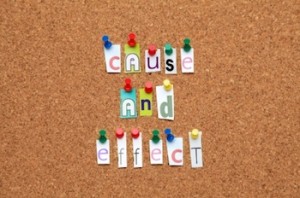
As an Autism psychologist, I’m often asked what causes Autism Spectrum Disorder. Unfortunately, no one knows exactly what causes it. There is probably no single cause. It’s likely that a complex combination of factors unfold gradually (before and after birth) to cause Autism.
Genetics
Heredity is widely accepted as playing a key role in determining Autism Spectrum Disorder. For this reason, Autism is considered a neurobiological condition.
Studies show that if one child of an identical twin pair has Autism, the other twin will also have Autism about 36-95% of the time. In non-identical twins, if one child has Autism Spectrum Disorder, the other is affected about 0-31% of the time.
Also, children with Autism Spectrum Disorder tend to have parents and/or relatives who have behavioral symptoms similar to Autism but in a more limited form.
This does not mean that Autism Spectrum Disorder is caused by one gene passed down from parents to children. It’s more likely that a common group of genes combine to render an individual vulnerable to developing Autism, and it is the combination of genes that determines the severity and symptoms for each individual with Autism Spectrum Disorder.
Brain Differences
It appears that brain development in people with Autism is altered soon after conception. Cells in the fetus migrate to other parts of the brain in unusual ways, resulting in underdeveloped connections among these parts and altering the overall organization of the brain.
Mirror Neurons
A mirror neuron is a nerve cell in the brain that is set off when one person observes another person performing a familiar action. Thus, the neuron “mirrors” the behavior of the other person.
Scientists have found that the mirror neuron system in people with Autism Spectrum Disorder is different from the general population; activation of the circuits that cause imitation is delayed.
Since people with Autism have trouble recognizing how and why other people act, it is possible that an improperly developed mirror neuron system plays a role in generating this condition.
Environmental Causes
Because of the rapid increase of Autism Spectrum Disorder in recent decades, research has focused on possible causes, such as infectious diseases, heavy metal toxicity, stress, and other environmental factors. None of these, however, has been shown to cause Autism.
Some people have suggested that vaccine exposure, particularly measles vaccine and thimerosal, a mercury preservative used in some vaccines, causes Autism. However, the overwhelming majority of studies shows no evidence for any association between immunizations and Autism Spectrum Disorder.
Parenting
Since the discovery of Autism in the late 1940s and up to the 1970s, it was believed that Autism was the result of bad parenting. Parents who did not spend an adequate amount of time with their children or interact appropriately with them were thought to be responsible for their children’s unusual behavior or difficulty socializing.
The evidence is overwhelming that bad parenting does not cause Autism Spectrum Disorder. I have seen this proved time and again in my work as an Autism psychologist. Even more convincing is the fact that families with children who have Autism Spectrum Disorder also have children without Autism.
Is the Cause of Autism Spectrum Disorder Important?
In most cases, Autism Spectrum Disorder is probably caused by a combination of genetic risk factors that interact with environmental risk factors. A great deal of research is being undertaken to determine how both genetic and environmental risk factors contribute to Autism Spectrum Disorder.
There are some common misconceptions about people with Autism. It cannot be caused by the way a person was brought up, bad parenting, or emotional issues a child may have experienced at some point early on. As a neurobiological disorder, Autism is not the result of a person’s life experiences.
Whatever the direct cause may be, Autism Spectrum Disorder can be treated. Professionals, such as an Autism psychologist, can help children and adults develop better communication and social skills. Support from therapists combined with support from parents, teachers, and friends will help those with Autism overcome their problems and lead healthy lives.
